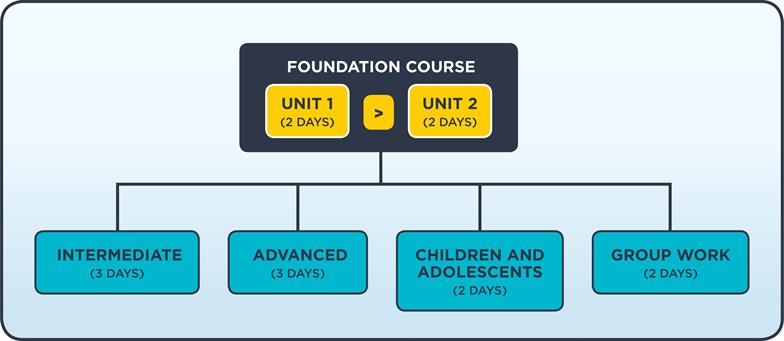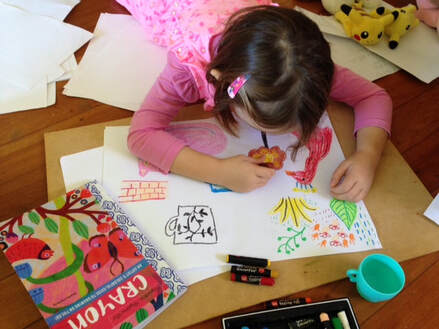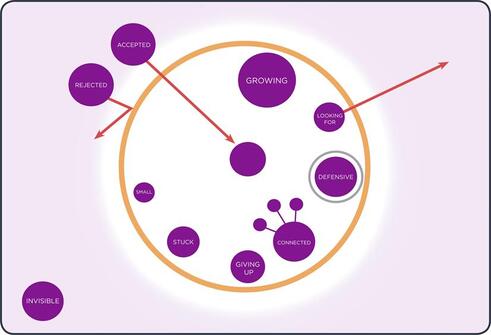Course Information
Our inspiring carefully developed, skills-based training courses have earned a consistently high reputation for delivering quality, user-friendly, results-based, value-for-money outcomes that are guaranteed to rapidly improve your professional effectiveness and provide you with special tools for assessment and strategic intervention.
WORKSHOPS (new prices for 2023) |
NEW ZEALAND |
AUSTRALIA |
IDT Foundation Unit 1 and 2 - 4 days |
NZD1000 |
AUD1000 |
IDT Foundation (Unit 1 or 2) - 2 days |
NZD550 |
AUD550 |
Working with Children and Adolescents - 3 parts (online) |
AUD550 |
AUD550 |
IDT Groupwork - 2 days |
n/a |
AUD550 |
IDT Advanced - 3 days |
NZD770 |
AUD770 |
*All prices quoted not including GST
** All prices are due one month prior to the course start date
*** Some prices may vary due to venue cost
** All prices are due one month prior to the course start date
*** Some prices may vary due to venue cost
- FOUNDATION - Unit 1 and 2 (4 Days)
- Two independent but consecutive units (Unit 1 and Unit 2)
- The Foundation Course is a pre-requisite for further training in IDT
- Most course participants enrol in the Foundation Course as a package
- Does not require artistic ability.
- INTERMEDIATE (3 Days)
- ADVANCED (3 Days)
- WORKING WITH CHILDREN AND ADOLESCENTS (2 Days)
- GROUP WORK (2 Days)
IDT FOUNDATION
FOUNDATION Unit 1 |
FOUNDATION Unit 2 |
|
|
INTERMEDIATE
- A three day training workshop
- As clients layer themselves onto the page they can be seen to move through distinct ‘levels of work’
- This workshop helps participants recognise which level the client is available to work at, and how to shape appropriate level-specific interventions
- The focus is on building counsellor resourcefulness and confidence and keeping clear boundaries between the clients work and the counsellors work
- Focusses on seven vertical levels of work
- Each level has its own particular function and unique set of tasks
- The Course has a typical IDT training format of high information input, demonstrations, hands-on experiential sessions, and group discussion
- The Intermediate Course takes much of the content of Unit 2 considerably further
- You will gain increased confidence in helping clients work with unconscious material and the uncertainty of not-knowing
- Must have completed Foundation Course
ADVANCED
- A three day training workshop
- Provides an in-depth exploration of the IDT Therapeutic Process
- Helps recognise clients’ needs, tasks and challenges to formulate appropriate stage specific interventions
- A robust hands-on experiential training
- Focusses on the seven horizontal ‘stages of change’ in the IDT Therapeutic Process
- Must have completed Foundation Course
- Learning Outcomes include:
- Accurately read which stage the client is at
- Anticipate stage-specific risks and dangers
- See the big picture and not get caught in client content
- Match session management to stage requirements
- Expand your ability to bring safety and containment
- Learn how to work at deep levels with sub-personalities, archetypes, metaphor and symbol
WORKING WITH CHILDREN AND ADOLESCENTS
- A two day training workshop
- Children and adolescents have different developmental capacities requiring us to modify our use of IDT
- The course maps the key developmental stages of the young person to provide guidelines for interventions
- One of IDT’s principles is to ‘be where the client is’. This includes meeting their psychological age
- Learn to work collaboratively, developing the page with the client
- Develop your advocacy skills further using the page for the young person
- Learn to recognise when the psyche retreats to an earlier developmental phase (regression) and how to work with it
- Increase your awareness of transference and counter-transference in the working relationship
- This workshop is valuable to not only those who work with young people. All clients have the capability to regress to an earlier developmental phase
- Must have completed Foundation Course
GROUP WORK
- A two day training workshop
- An experiential workshop on how IDT can be used when working with groups
- Will improve your group facilitation skills and awareness
- A safe and non-threatening way of working, where clients talk less about themselves and more about the page
- Group work is an efficient and cost effective way of working with clients
- Participants learn by watching others and projecting onto their pages
- Collective goals can reduce individual performance anxiety
- Must have completed Foundation Course
- The workshop looks at:
- Nature of groups
- Group process
- Group culture
- Facilitator role and style
- Contracting
- Multiple agendas
- Conflict and safety
- Projection, transference and counter-transference
- Themes and purpose
- Developing group programmes and activities



